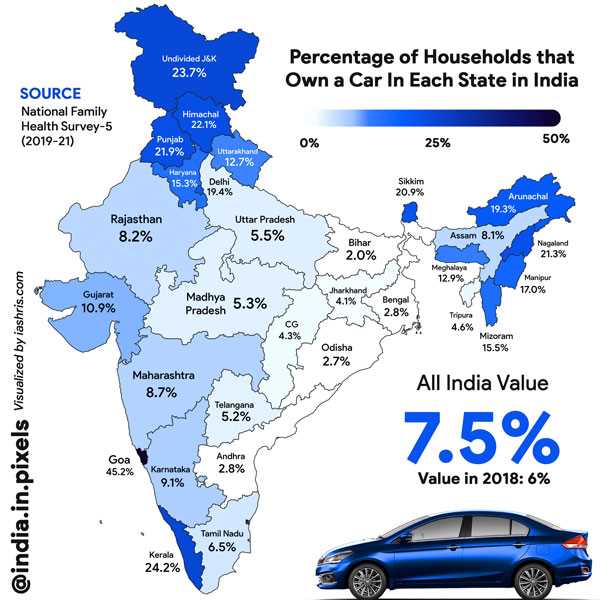
23.7% households in J&K have cars; Kerala leads with 24.2%
Bihar at bottom of list with 2% car ownership per household
After Kerala, Jammu and Kashmir comes at second place in the country with highest car ownership per household, according to National Family Health Survey 5 (NHFS).
According to NHFS data, 23.7 percent households in Jammu and Kashmir have personal cars, which is the second highest among all the states and union territories of the country.
The national figure of car ownership per household stands at 7.5 per cent, much lower than the figure of Jammu and Kashmir while Kerala leads the country with 24.2 percent households owing a car.
The NHFS data shows that Jammu and Kashmir is followed at third place by Himachal Pradesh with 22.1 percent car ownership per household followed by Punjab with 21.9 percent house holding having private cars.
Bihar and Odisha are at the bottom of the list with 2 percent and 2.7 percent car ownership per household, according to the National Family Health Survey 5 which was recently released by the union government.
Sharing a graphical photo on the data about the ownership pattern of the cars in the country, Anand Mahindra, Chairman of Mahindra Group which produces world class luxury and off-road cars, tweeted: “It is intriguing. No single data correlation for car ownership such as literacy rate, per capita income level, or geographic character. GDP per capita is perhaps the best fit?”
The National Family Health Survey is a large-scale, multi-round survey conducted in a representative sample of households throughout India, according to a noting on the official website.
Three rounds of the survey have been conducted since the first survey in 1992-93. The survey provides state and national information for India on fertility, infant and child mortality, the practice of family planning, maternal and child health, reproductive health, nutrition, anaemia, utilization and quality of health and family planning services, it said.
Each successive round of the NFHS has had two specific goals: a) to provide essential data on health and family welfare needed by the Ministry of Health and Family Welfare and other agencies for policy and programme purposes, and b) to provide information on important emerging health and family welfare issues.
The Ministry of Health and Family Welfare (MOHFW), Government of India, designated the International Institute for Population Sciences(IIPS) Mumbai, as the nodal agency, responsible for providing coordination and technical guidance for the survey. IIPS collaborated with a number of Field Organizations (FO) for survey implementation.
Each FO was responsible for conducting survey activities in one or more states covered by the NFHS, the noting states.
23.7% households in J&K have cars; Kerala leads with 24.2%
Bihar at bottom of list with 2% car ownership per household
After Kerala, Jammu and Kashmir comes at second place in the country with highest car ownership per household, according to National Family Health Survey 5 (NHFS).
According to NHFS data, 23.7 percent households in Jammu and Kashmir have personal cars, which is the second highest among all the states and union territories of the country.
The national figure of car ownership per household stands at 7.5 per cent, much lower than the figure of Jammu and Kashmir while Kerala leads the country with 24.2 percent households owing a car.
The NHFS data shows that Jammu and Kashmir is followed at third place by Himachal Pradesh with 22.1 percent car ownership per household followed by Punjab with 21.9 percent house holding having private cars.
Bihar and Odisha are at the bottom of the list with 2 percent and 2.7 percent car ownership per household, according to the National Family Health Survey 5 which was recently released by the union government.
Sharing a graphical photo on the data about the ownership pattern of the cars in the country, Anand Mahindra, Chairman of Mahindra Group which produces world class luxury and off-road cars, tweeted: “It is intriguing. No single data correlation for car ownership such as literacy rate, per capita income level, or geographic character. GDP per capita is perhaps the best fit?”
The National Family Health Survey is a large-scale, multi-round survey conducted in a representative sample of households throughout India, according to a noting on the official website.
Three rounds of the survey have been conducted since the first survey in 1992-93. The survey provides state and national information for India on fertility, infant and child mortality, the practice of family planning, maternal and child health, reproductive health, nutrition, anaemia, utilization and quality of health and family planning services, it said.
Each successive round of the NFHS has had two specific goals: a) to provide essential data on health and family welfare needed by the Ministry of Health and Family Welfare and other agencies for policy and programme purposes, and b) to provide information on important emerging health and family welfare issues.
The Ministry of Health and Family Welfare (MOHFW), Government of India, designated the International Institute for Population Sciences(IIPS) Mumbai, as the nodal agency, responsible for providing coordination and technical guidance for the survey. IIPS collaborated with a number of Field Organizations (FO) for survey implementation.
Each FO was responsible for conducting survey activities in one or more states covered by the NFHS, the noting states.
© Copyright 2023 brighterkashmir.com All Rights Reserved. Quantum Technologies